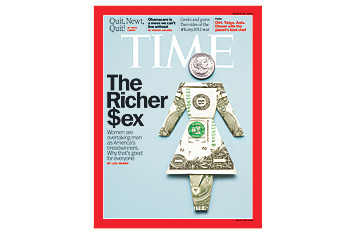
(7 of 7)
While he was still unemployed, Michael took their cat to the vet and approved an expensive procedure without asking Rose. "I was kind of upset about it," she says. "I don't know if I would have expected him to ask my permission, but at least tell me before spending it. I did kind of feel like, You just spent a bunch of my money without telling me."
More than one woman had a hard time embracing the idea that her earnings were not entirely hers. One lawyer in Washington is married to a consultant who took the slow track, with her wholehearted approval. Even given their careful egalitarianism, the wife acknowledges secret, almost illicit proprietary feelings about her income. "I have friends where it's the man who's earning more money, and the woman says to me, 'He gets really upset when I want to redecorate the kitchen,' and I'm supposed to be very sympathetic to the woman because I'm a woman," she says. "But I also understand the husband's point of view much better than I would like to. I understand the feeling that 'I've earned it.'" The lawyer is aware that feeling more entitled to the money undermines the sharing inherent in a marital partnership. "If I caught myself feeling [that way], I would censor it, but I think it's there--it's there from the culture."
Already these questions and tensions reach down into the next generation, as girls hear a new message about their future responsibilities. This goes beyond the girls-rule-and-you-can-grow-up-to-be-whatever-you-want message. Supporting a family is a far greater burden than just supporting oneself, and it is now one that women and men are equally likely to bear. As the number of single-parent families grows--41% of babies are born to single women--young women are acutely aware that they may be the sole earner in their household. Even women with boyfriends who are prepared to step back, take the slow track and stay at home are not necessarily feeling empowered by it. One young woman was both gratified that her boyfriend was willing to move for her career and leery of getting "boxed in as the higher earner," which sounded to her like "a lot more work and a lot less play."
But in many families, there is a new realization setting in. The notion of perfect equality in all tasks, work, wages and power was never realistic; men and women, especially when they form households, are complex creatures with individual gifts and needs. It would be nice to imagine a world where employers make it possible for all mothers and fathers to work reasonable hours. But some jobs will always require more than eight hours a day. For a woman, like a man, reaching the highest levels of achievement may depend on a spouse willing to downshift. What's new is that the decisions about who dials back will be based on personal aptitude and what works best for each couple rather than outdated notions of which sex is better fitted to what.
